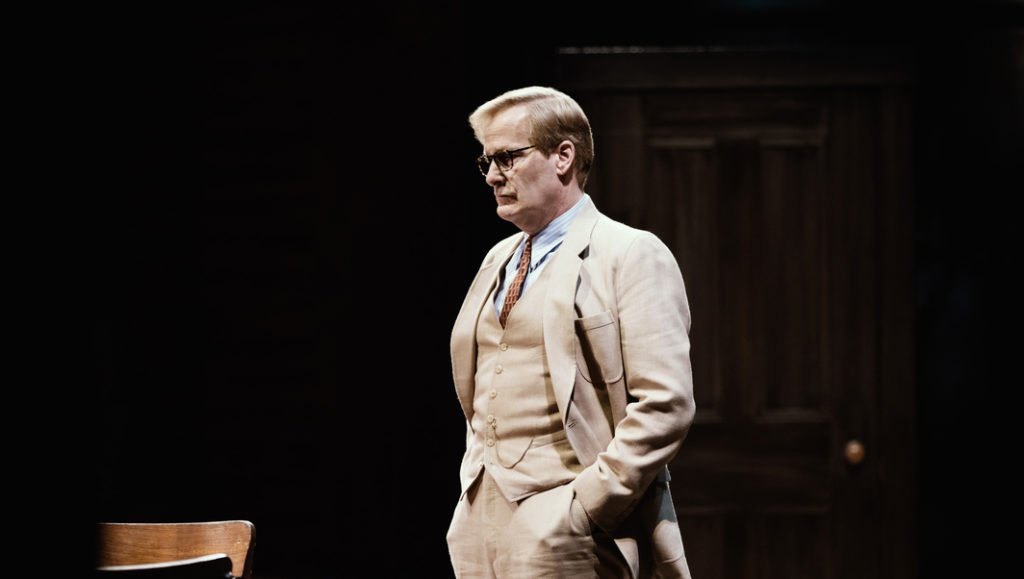Theater Review: Harper Lee’s To Kill a Mockingbird

Harper Lee’s To Kill a Mockingbird has finally arrived on Broadway after a long and bumpy road; it was absolutely worth the wait. Written by Aaron Sorkin and directed by Bartlett Sher, this essential production is an inspired, and inspiring, adaptation of an American classic.
The novel’s main narrative remains intact. Six-year-old Scout Finch (Celia Keenan-Bolger) ponders big questions as her father – Atticus (Jeff Daniels), a lion among lawyers – defends Tom Robinson (Gbenga Akinnagbe), a man of color who has been wrongly accused of raping a white woman in Depression-era Alabama. The ugliness of American racism hangs over the trial, as Robinson’s obvious innocence is obscured by a single-minded prosecution that uses the law to enforce racial subordination. Like an afternoon shadow creeping across a sun-bathed porch, Scout’s innocence melts away as she begins to understand that the world – and the people in it – are far more complex than her young mind supposed.
Adapting a beloved classic – which was recently named America’s favorite novel in PBS’s The Great American Read – is a tall order. Yet, like Robert Mulligan’s 1962 film adaptation of the novel, this production is a resounding triumph. Its success partly comes from Aaron Sorkin’s lyrical script, which captures the hope and heartbreak that tie together the novel. Credit must also go to Bartlett Sher, in whose hands this production shimmers with gentle grace, always engaging, challenging, and moving. Sher has built a reputation as someone who breathes new life into theatrical classics – like South Pacific, The King and I, and Fiddler on the Roof – and ably adapting other stories to theater – like The Bridges of Madison County. Both skills serve him well in bringing a classic American novel to the stage. With the help of Miriam Buether’s simple but atmospheric design, Adam Guettel’s quiet church music that promises to uplift weary souls, and powerful performances from a universally excellent cast, Sher creates a unified world on stage in which sinners and saviors aren’t easily distinguishable.
Perhaps the biggest pleasure of this production is the performances. Jeff Daniels is a good, if not sensational, Atticus, capturing the character’s usual intelligence and compassion, but also infusing him with humor and human foibles. This production also gives Calpurnia, the Finch family’s black housekeeper, a stronger voice than she gets in the novel, even though her function is still limited to her service to the family. LaTanya Richardson Jackson is dynamic in the role, bringing to life a warm, sharp character whose sense of justice challenges Atticus to do better.
One of the most interesting decisions that Sher has made is to cast adults in the role of the three children at the center of the story. It’s always tricky whenever adults play children, since their long-toothed self-awareness sometimes results in over-acting and risks coaxing them further away from the instinctive naturalness of childhood. Happily, the skilled actors playing Scout, Jem (Will Pullen), and Dill (Gideon Glick) resist this temptation and are all wonderful in their parts. As Scout, the central character, Keenan-Bolger especially shines – she is simply astonishing. She enlivens Scout with always charming, never cloying childlike movements that hit the right note and flesh out one of the most iconic characters in American literature. Her Scout is a fidgety, restless wonderer whose boundless curiosity allows her to interrogate, with clear-eyed directness, the hypocrisy and injustice that surrounds her.
Appropriately, it’s Scout who murmurs the play’s prayer-like refrain: “All rise,” a phrase repeated throughout the play that challenges the audience to pursue the noble promise of liberty and justice for all. It is a call to heed our better angels, to act with compassion in a world filled with suffering. The delivery of the words and the staging supporting them is enough to take your breath away. As a piece of purposeful theater, To Kill a Mockingbird doesn’t transform the audience in a strict sense. Instead, it asks the members of the audience to elevate themselves and lift up the very soul of the American nation.
Photo Credit: Julieta Cervantes


Discussion about this post